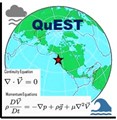Project Goals
-
Attract students who are intereste
 d and capable in math, physics, computing, and other quantitative disciplines to learn and develop skills in the context of subjects that are both fascinating and important to society.
d and capable in math, physics, computing, and other quantitative disciplines to learn and develop skills in the context of subjects that are both fascinating and important to society. - Define new, forward‐looking outcomes for our quantitative specializations.
- Articulate new or improved curricular and course-based strategies that enable students to meet these outcomes and core competencies.
Anticipated impacts
Enhanced recruiting and improved visibility of opportunities will attract more students wanting to pursue quantitatively oriented degrees that will equip them for success in a range of existing and emerging academic and career pathways that are both socially critical and personally rewarding.
Redesigned curriculum will emphasize fundamentals within contexts such as climate, energy, resources, hazards, and ocean, landscape or atmospheric dynamics of Earth and other planets.
The efficiency, efficacy and satisfaction of instructors will increase. Also, new inter‐disciplinary synergies will emerge giving students an integrated, holistic understanding of Earth Science and the roles of quantitative thinking across disciplines.
For more information, please see our project Blog at https://blogs.ubc.ca/eoasquest/
People and partnerships
- Project lead: Christian Schoof.
- Primary project support: Francis Jones
- EOAS faculty: Proponents within EOAS include Philippe Tortell, Eldad Haber, Phil Austin, Stephanie Waterman, Susan Allen, Ali Ameli, Roger Beckie, Uli Mayer, Michael Bostock, Catherine Johnson, Mark Jellinek, Richard Pawlowicz, Valentina Radic, Roland Stull, Rachel White, AnaÏs Orsi, Mitch D’Arcy, Tara Ivanochko, Erik Eberhardt, Scott McDougall, Brett Gilley.
-
Student involvement:
- Surveys and focus groups conducted in Fall 2018 and 2019.
- Work-learn and co-op students (none for QuEST yet, but 5 in year 1 of OCESE)
-
Related projects
- OCESE: a 3-yr EOAS project with “Large TLEF” Funding.
- Data Science Minor, a program coordinated out of the Stats department.
- DSCI 100, a new first year course introducing statistics, data science and programming.
Status and further details
- Funding & Departmental commitment: AER funding approved. Department has assigned a lead, committee members, and dedicated support of one part time geophysicist / education specialist.
- Anticipated timeline: Started Oct. 2020. Final reports anticipated for December 2022.
- Website, GitHub, reports, or other details: (coming soon).
